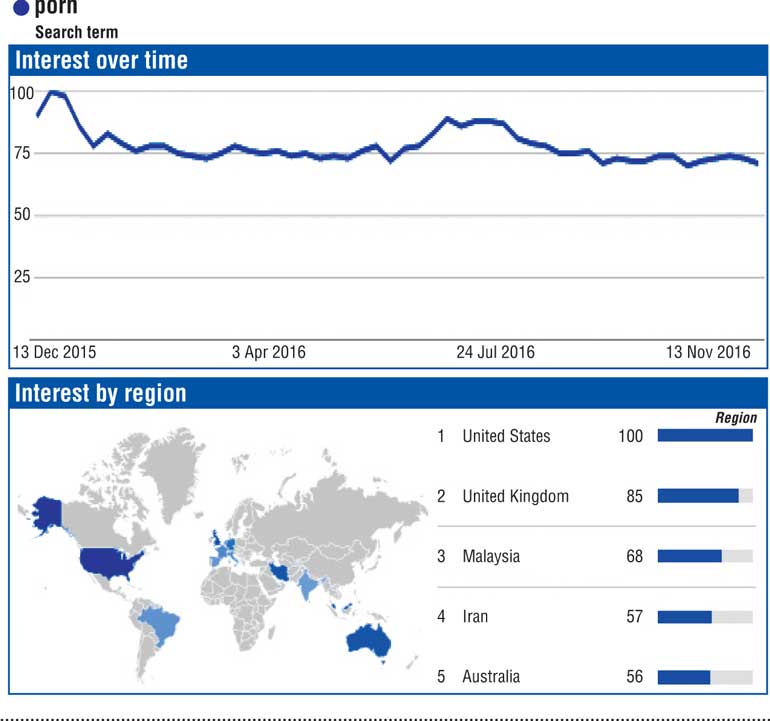Monday Feb 23, 2026
Monday Feb 23, 2026
Thursday, 15 December 2016 00:01 - - {{hitsCtrl.values.hits}}
It’s perfectly normal for humans to search for sex. Wanting to reproduce is an instinct hardwired to all animals. Whether you believe in creation or evolution, you exist thanks to reproduction. So suck it up (not sexually suggestive).
Every year a bunch of people eagerly wait to see which country searched highest, the term “sex” on Google Search during that year. They reach climax when they see Sri Lanka on top of the list.
Newspapers write and anchors read “Sri Lankans are No. 1 in search for sex, AGAIN”, followed by an orgy of bashing Lankan culture, education, religion, history and basically every damn thing. Every December Lankan morality is burned on the stake because some people typed three letters inside a text box. But are Lankans really that desperate? Let’s see.
Google Trends is misleading
Anybody can go to Google Trends and type in any search term to check its popularity. It’ll show you the “Interest by Region” on a gradient world map coupled with the top list of countries. So if you type in “sex” as the search term, Sri Lanka is indeed on the top.
Google Trends is a very crude piece of statistic. All it does is count the total number of times the specific term “sex” was typed in to the Google search box from each region, and divide that value by the total count for all the search terms in the set period coming from that region. It then assigns a score of 100 to the highest fraction and ranks the rest of the countries relatively.
In other words, this tool is to measure the relative “popularity” of a search term in a specific geographical location. It does not give the absolute counts so we really don’t know how many searches we are talking about.
If you click on Sri Lanka, you see the provincial distribution. If you click on Western Province, you’ll see only four cities, Homagama, Panadura, Wattala and Colombo. In North Western Province it’s only Kurunegala. Does that mean Lankans living elsewhere are not “interested in sex”? I sure hope not. Does that mean Homagama has more perverts than any other place? I don’t think so. What it means is that the purpose of the statistic is to give a relative indication of the popularity of something, without any adjustments; and that too in the confinements of Google.
Sex, sexy, porn, pornography, gay porn, rough sex, orgy, threesome…
Sex is a general term. It could simply mean the gender type, the act of sex or sexual content. The intention of the searcher could be  to learn about the reproductive system, how to perform sex, what happens after sex, how to get pregnant, sexually-transmitted diseases or to look at pictures of naked men and women doing naughty things. Who knows? And who cares?
to learn about the reproductive system, how to perform sex, what happens after sex, how to get pregnant, sexually-transmitted diseases or to look at pictures of naked men and women doing naughty things. Who knows? And who cares?
Trinidad and Tobago tops the list for “porn”, Armenia tops for “porno”, Zimbabwe tops for “pornography”. Different results for variations of the same word. “Porn” is equally popular in the United Kingdom and Sri Lanka. Popularity varies for different search terms relevant to the topic. Perhaps different countries use different words to look for the same thing. The point is that the available data is too little to make any meaningful conclusion.
Furthermore, it’s hard to think of any direct relationship between the count of searches for sex with the total count of all searches. So comparing the two variables is illogical. The only use of this piece of statistic is that it would help website admins with Search Engine Optimisation.
Web, image, news, shopping and YouTube
Popularity also changes based on the search platform. Sri Lanka tops for search term “sex” on the basic web search. Ethiopia tops on Google Image Search. Iran tops on Google Shopping. United States and United Kingdom are the top two for “Porn” on Google Shopping.
India is the only country that is listed for the search term “child sex” on YouTube. Does that mean India is the only country that is searching videos for “child sex”? And are the searchers all paedophiles or people hunting the paedophiles? We don’t know. It’s ridiculous to define a nation and its people based on these grossly-misleading data.
To really understand these trends, we need an in-depth research based on population, demographics, internet penetration, language, purpose, seasonal trends, etc. We must also remember that we have no way of verifying this data coming from Google.

The real worry is not sex
A plausible explanation to this observation could be that Lankans are not searching for other popular global search terms. Our small population may be more concerned about our petty internal topics, politics and gossip, we don’t search for a lot of things that other countries search online. This would explain why smaller countries with low internet usage like Nepal often hover in the top for most generally used words.
How many of you searched “Lamar Odom”, or “Charlie Hebdo”, or “Paris” or “Caitlyn Jenner” or “Jurassic World” which were the top search terms in 2015? (2016 data is still not released) A country like the United States which has over 320 million people and with an internet usage of over 88% of the population can easily skew their trends just by releasing a Hollywood blockbuster movie that year or having Donald Trump run for presidency.
Lankan media is not helping because all we see is mediocre local content on our so-called “news”, the Lankans are not aware of the global topics let alone bother to search for them on Google. The real reason why I wrote this article is to discuss this sad trend. We are not even in the list for the search term “climate change” nor for “global warming” nor for “enterprise”. We are 22th on search for “innovation”.
The question is not why we are searching for more sex, because we are NOT. We are probably searching for sex as the same rate as any other population would search for sex because we are all human and sex is a basic need. Instead we must ask, how do we get Lankans to search for other things happening in the universe? May be Lankan media should talk less about “Parliament Jokes” and giving sensationally wrong headlines like “Sri Lanka Tops Sex Search”, instead talk more about “World Affairs”, “Scientific Discoveries”, “Technology” and “Social Issues”.
(All trends are for the past 12 months)